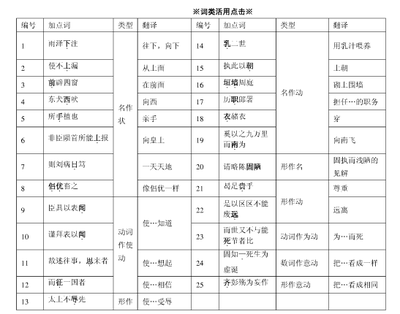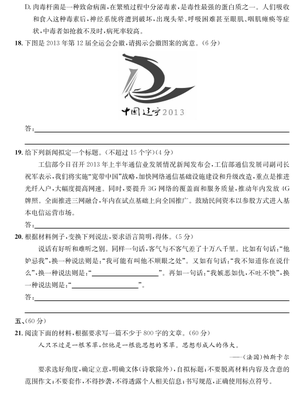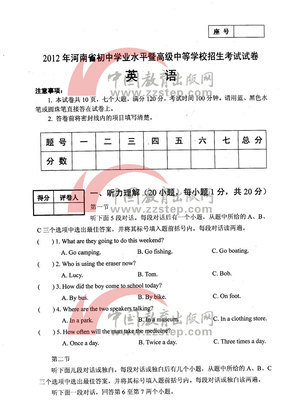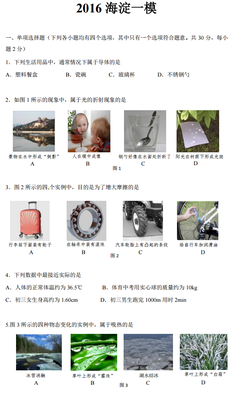北京市朝阳区九年级综合练习(二)
英 语试 卷2013.6
学校班级姓名考号
考 生 须 知 | 1. 本试卷共12页,满分120分,考试时间120分钟。 2. 在试卷和答题纸上准确填写学校名称、班级、姓名和考号。 3. 试题答案一律填涂或书写在答题纸上,在试卷上作答无效。 4. 在答题纸上,选择题用2B铅笔作答,其他试题用黑色字迹签字笔作答。 5. 考试结束,请将本试卷和答题纸一并交回。 |
听力理解(共26分)
一、听对话,从下面各题所给的A、B、C三幅图片中选择与对话内容相符的图片。每段对话你将听两遍。(共4分,每小题1分)
|
A.B.C.
|
A.B.C.
|
A.B.C.
|
A.B.C.
二、听对话或独白,根据对话或独白内容,从下面各题所给的A、B、C三个选项中选择最佳选项。每段对话或独白你将听两遍。(共12分,每小题1分)
请听一段对话,完成第5至第6小题。
5. What’s wrong with the woman?
A. She has a fever.B. She has a headache.C. She has a cough.
6. How many times should she take the medicinea day?
A. Twice.B. Three times.C. Four times.
请听一段对话,完成第7至第8小题。
7. What class is Peter going to have?
A. A mathclass. B. A Chineseclass.C. An English class.
8. What does Peter think of English?
A.Boring.B. Useful.C. Difficult.
请听一段对话,完成第9至第10小题。
9. How will they go to the City Parktomorrow?
A. Onfoot. B. Bybike.C. By bus.
10. What will the boy do tomorrow afternoon?
A. Work on the farm.B.Swim in theriver.C. Do some cleaning.
请听一段对话,完成第11至第13小题。
11. What’s the matter with the camera?
A. It’slost. B.It’s in pieces.C.It doesn’t work.
12. How much money does Tony need to buy a new camera?
A. $ 200.B.$ 400.C.$ 800.
13. How long should Tony work at the job to get enoughmoney?
A. For 2months. B. For 4months.C. For 8 months.
请听一段独白,完成第14至第16小题。
14. Who does the speaker want to help?
A.Students.B.Parents.C. Teachers.
15. Which of the following can the service tell us?
A. Where to find ajob.B. How to ask for ajob.C. What kind of job to get .
16. How can we connect with the service?
A. Face toface.B. Over thephone. C. On theInternet.
三、听对话,根据所听到的对话内容和卡片上的提示词语,将所缺的关键信息填写在答题纸的相应位置上。对话你将听两遍。(共10分,每小题2分)
A survey of TV-watching habits | ||
occupation | 17 | |
how many hours | 18 hourseach day | |
likes to watch | program | 19 |
reason | / | |
doesn’t like to watch | program | 20 |
reason | not21 | |
occupation : 职业
知识运用(共25分)
四、单项填空 (共13分,每小题1分)
从下面各题所给的A、B、C、D四个选项中,选择可以填入空白处的最佳选项。
22. –Excuse me. Is that your bike?
--No, it’s not ______.
A.hisB.hersC.yoursD. mine
23. I usually get up ______seven o’clock every morning.
A.atB.onC.inD. to
24. I have two brothers. One is a manager, ______ is adoctor.
A.otherB.anotherC.othersD. the other
25. –Would you like to play basketball with us?
--I’d love to. But I must finish ______ my room first.
A.clean B. to cleanC.cleaningD. cleaned
26. There are no buses,youhave to go there by bike.
A. soB. orC.butD. for
27. Lingling’s English is much ______ than any other student’sin her class.
A.goodB.betterC. bestD. the best
28. We ______ a football game with Class 2 yesterday.
A. haveB. hadC. will haveD. are having
29. ––What does your mother do to keep healthy, Tom?
––She usually ________.
A. swimsB. swamC.will swimD. is swimming
30. –Listen! My sistertheviolin.
–What beautiful music! I like it verymuch.
A. playsB. playedC. is playingD. will play
31. We didn’t enjoy the tour ________ the weather wasterrible.
A.whenB.if C.thoughD. because
32. –Look! Mr. Brown is over there.
-- It can’t be him. He________ away since lastSunday.
A. wasB. has beenC. wereD. will be
33. Chinese _______ at many high schools in that countrytoday.
A. is taught B. is teaching C. willteach D. was taught
34. ––Could you tell me ________ the Bamboo Garden?
––The day after tomorrow, I think.
A. when will wevisitB. when did we visit
C. when we will visitD. when we visited
五、完形填空(共12分,每小题1分)
阅读下面的短文,掌握其大意,然后从短文后各题所给的A、B、C、D四个选项中,选
择最佳选项。
Mary, a 22-year-old young woman, stands in the kitchen of theEdsa Shangri-La Hotel in Manila, preparing to make a cake. It wouldseem to be natural for a cook , but Mary is not normal. She has no35.
Her disability (残疾), however, only36her down while working. Using other parts of herbody, Mary can cut grapes and strawberries into pieces and coat thesides of the cake with them. “When I first saw Mary, I was worriedshe might37herself when using a knife, but that has neverbeen a problem,” says the manager of the hotel. “She does not get38treatment and works just as hard as the rest ofthe cooks.”
Mary has come a long way since the day in September 2002 whenshe and her uncle were attacked (攻击) by twomen, who were trying to force her family off their land. The11-year-old girl passed out (晕倒) as she tried to39herself from the blows. After she came to her sense, she found her uncle dead and sawher arms broken. Later, the doctors did an40. They saved her life but could not save her hands.
In 2006, with the help of the family, Mary went to live at theHouse with No Steps, a Manila rehabilitation (康复) and trainingcentre for disabled people. She41how to write and do housework there. And moreimportantly, she came to terms with her disability. She believedshe42live a normal life although she was disabled. She thought she hadsomething important to do in life because she was still alive afterthe terrible attack. After she finished high school, she took atwo-year Hotel and Restaurant Management43because she had enjoyed cooking since she was alittle girl.
When Mary wasreportedon television, she didn’t44away from the attention. “I wanted others livingwith disabilities to believe it’s45to live a normal life,” Mary says. “It isdifficult to make a living, but I don’t lose46. I believe nothing is impossible if you dream and work hard.”
35. A.armsB.handsC.legsD. feet
36. A. putsB. takesC.slowsD.quiets
37. A.hurtB.hitC.killD. touch
38. A.enough B.specialC.usual D.common
39. A.save B.keep C.preventD. protect
40. A.operationB.examination C.introductionD. explanation
41. A.practicedB. studiedC.reviewed D.learned
42. A.wouldB.could C.shouldD. might
43. A.class B.lesson C.courseD. subject
44. A.shyB.run C.hide D. turn
45. A.exciting B.excellentC.simpleD. possible
46. A.directionB.hopeC.love D. life
阅读理解(共44分)
六、阅读下列短文,根据短文内容,从短文后各题所给的A、B、C、D四个选项中,选择最佳选项。(共26分,每小题2分)
A
Top 10 Universities in Asia | |||
Ranking in Asia | University | Country or Area | Global Ranking |
1 | University of Hong Kong | Hong Kong | 21 |
2 | University ofTokyo | Japan | 26 |
3 | Pohang University of Science and Technology | South Korea | 28 |
4 | National University ofSingapore | Singapore | 34 |
5 | Peking University | China | 37 |
6 | Hong Kong University ofScience and Technology | HongKong | 41 |
7 | University of Science and Technology of China | China | 49 |
8 | Kyoto University | Japan | 57 |
9 | TsinghuaUniversity | China | 58 |
10 | Korea Advanced Institute of Science and Technology | South Korea | 79 |
47. Where is the best university in the list?
A. In HongKong.B. InJapan.C. In SouthKorea.D. In Singapore.
48. How many universities in the list are in South Korea?
A.Two.B.Three. C.Four.D. Five.
49. Which university in the list is No. 34 in the world?
A. University ofTokyo.B. National University of Singapore .
C. KyotoUniversity.D. University of Hong Kong.
B
When he was 12 years old, the boy made a decision. He only laterrealized it probably hurt his teacher. He was, after all, a kid.But in time, when he was older and wiser, he wanted to find thisteacher and apologize (道歉). But the teacher seemed to havedisappeared.
In the past ten years, the boy, Larry Israelson, often turned tothe Internet, typing the teacher’s name into search boxes. He neverfound anything. But he never stopped looking. Last month—by nownearly 39 years after the event happened—he got a hit.
Excited, he started reading a story I had written in TheOregonian about a program that helps kids. He studied a photoand found his teacher, who was a volunteer. He then emailed me andasked me to introduce him to the teacher, James Atteberry.
I got in touch with Atteberry. He agreed to talk to his student.Shortly thereafter, I received a package with an envelope in it. Iimmediately took it to Atteberry.
As James Atteberry read the letter, he was brought back to 1973,when he was a history teacher in Huntington Beach. In the letter,Larry said, “I am truly sorry for leaving your seventh grade classduring the 1972—1973 school year. I don’t have many memories fromschool, but at the top of my exercise-book you wrote ‘You will gofar in life.’ Looking back on my younger self, I was proud to beyour student.”
When it comes to apologies, no one gets a pass. Everyone needsto receive one, and everyone needs to give one.
50. How long did Larry spend looking for his teacher on theInternet?
A. For 39years.B. For 12 years.
C. For 10years.D. For 2 years.
51. What did Larry feel sorry for?
A. Not finding the teacherearlier.B. Forgetting many school things.
C. Not finishing hishomework.D. Leaving the teacher’s class.
52. What’s the writer’s conclusion in the passage?
A. Students should apologize to their teachers.
B. The earlier you apologize, the better the result is.
C. One must apologize for every mistake he has made.
D. Everyone has to apologize and receive apologies in life.
C
On the morning of the day when he left Compton High School inLos Angeles, 18-year-old Allan Guei asked seven of his classmatesto come together. Guei, a star on the basketball team, expressed hewas giving away the $ 40,000 he’d won in a competition and wasdividing it among them. The room filled with shouts and cheers.“Everyone went mad with excitement,” he says. “They were surprisedthat I would do something like that for them.”
In November 2000, Guei’s family moved from the Ivory Coast tothe United States, and he immediately took up basketball. “When Ifirst came to California, the Lakers were winning: it was KobeBryant, Shaquille O’Neal era (时代),” he recalls. “I just fell inlove with the game.”
A few years later, he was playing for the school. Then, inMarch, he entered a free-throw competition at the school, and thetown saw just how big a team player Guei really is—both on and offthe court (球场).
In the first round, each of the eight contestants (竞争者) took tenshots, and the top four shooters advanced. “I was one of the finalfour, but I really didn’t shoot that well,” Guei says. “I wasnervous!” In the second round, however, he took the winning shot.He went home with the prize of $ 40,000.
A few months before Guei left school, he was offered a fullscholarship (奖学金) to California State University, and he had anidea. “I could have kept the prize money, but I was already goingto college for free,” Guei says. “I knew the others were going tohave a lot of difficulty paying for school. They needed it fortheir futures, so I just decided to give it away.”
Now wearing No. 25 on Northridge’s Matadors basketball team,Guei has little time for anything but training and studying, thoughhe keeps in touch with most of his classmates. “I know those kids.Whatever they decide to do in life is going to be something good,”he says. “It was just the right thing to do.”
As for his own future, Guei is still learning. “I work reallyhard at everything I do,” he says. “But whatever happens in myfuture, I’m just happy that I was able to help somebody else alongthe way.”
53. When did the things described in the first paragraphhappen?
A. As soon as the competition wasover.B. When Guei just finished high school.
C. As soon as Guei got thescholarship.D. When Guei already went to college.
54. What does the writer mean by how big a team player Guei isoff the court?
A. He works hard at hislessons.B. He is good at making friends.
C. He doesn’t like money atall.D. He’s set a good example in life.
55. Which of the following can be the best title for thepassage?
A. The Most ValuablePlayerB. The Most Hopeful Star
C. The Greatest PrizeWinnerD. The Best Friend of Ours
D
It took 13 years of international effort to map the humanbiological blueprint of all the genes (基因) that make us differentpeople. The first rough draft (草图) was made in 2000. The last ofour 23 chromosomes (染色体) was clearly described in 2006. Ever sincethen, the age of personal genetic testing has been upon us. Sincethat time, a growing number of private companies have come on themarket mostly through the Internet, offering to scan (扫描) yourpersonal DNA and compare it to some disease markers of theblueprint, called DTC genetic tests.
But over the last five yearsthe medical world has been discussing excitedly about whether theseDTC tests are helpful or harmful, scientifically believable orcompletely useless. One of the usual criticisms (批评) is that thescience is so new that no one really knows yet how to explain theinformation.
“At present they largely remainin the period of research studies,” notes Dr Greg Feero, specialadvisor to the director of genomic medicine at the US NationalHuman Genome Research Institute. Feero says there are two reasons.“The first is that when they offer a test, are they really checkingwhat they should check? And then the next is that even if it isbelievable, does what the test is checking really mean anything toyour health?”
Other worries include the privacy of the resultsand how your personal genetic information might be used byinsurance (保险) companies to refuse your insurance or your boss todismiss you. Or you could learn information with a huge social orpersonal impact (冲击), such as finding out that genetically youcannot possibly be the father of your child. It can also give yourisks (风险) that may break your life, such as whether you are athigh risk of cancer, Parkinson or other terrible diseases.
Criticisms over the tests aresuch that some countries, such as Germany, have banned (禁止) them.In 2011, some scientists advised the US government that most testsshould be done under the guidance of medical professionals (专家).The UK government also expressed its worries about DTC genetictests and in August 2010 made a set of rules to guide thedevelopment of genetic tests.
In 2011, three medical researchers published areview article in the International Journal of ClinicalPractice, saying that such tests offered more risks thanbenefits. The most important reason is that the tests might createworries or unreal results or drive unnecessary medical treatments.They also noted some of the genetic information the tests are basedon at present is far from being perfect.
56. When did the research of human genes begin?
A. In1987.B. In1993.C. In2000.D. In 2006.
57. What is the result of the medical world’s discussion aboutgenetic tests?
A. They are both good and bad forpeople.B. They are useful for some companies.
C. They still remain the period ofresearch.D. They have caused a lot of criticisms.
58. The most important fact that causes the worries aboutgenetic tests is that ______.
A. people are too weak to receive social or personal impact
B. we are afraid to face the bad news that will break ourlife
C. doing these tests is against the laws in a lot ofcountries
D. little is known about genes and the information theycarry
59. What can we infer from the passage?
A. Something must be done to stop genetic tests.
B. Discussion about genetic tests is needed among people.
C. More research work needs to be done about genetic tests.
D. With the help of the government, genetic tests can developfast.
七、阅读短文,根据短文内容,从短文后的五个选项中选出能填入空白处的最佳选项。选项中有一项为多余选项。(共8分,每小题2分)
A group of frogs were traveling through the woods, and two ofthem fell into a deep hole. When the other frogs saw how deep thehole was, they told the two frogs that they were hopeless to bealive. But the two frogs didn’t believeit.60 . The other frogs kepttelling them to stop and wait for their death. Finally, one of thetwo frogs gave up and fell down. Soon he died.
The otherfrog continued to jump as hard as he could. Once again, the crowdof frogs shouted at him and told him to stop and just wait todie.61 .
When he got out, the other frogs said: “Didn’t you hear us?” Thefrog explained to them that he wasdeaf.62 .
The story teaches us twolessons.63 . An encouraging word tosomeone who is down can cheer him up and help him make it throughdifficulties. Secondly, a destructive (消极的) word to someone who isdown can make him give up and die. So be careful of what yousay.
Speak life to those who cross your path. It is sometimes hard tounderstand that an encouraging word can go such a long way. It isgreat for a person to take the time to encourage another.
A. Then the two frogs began to stop jumping B. But he jumped even harder and finally he made it C. Firstly, there is power of life and death in the tongue D. So he thought they were encouraging him at that time E. They tried to jump up out of the hole with their efforts |
八、阅读短文,根据短文内容回答问题。(共10分,每小题2分)
Are your spending habits doing you more harm than good? Gettingcontrol of your daily money is an important part of personalfinancial management. These following steps will help you.
Track (追踪) your spending
How much money did you spend last month? Mostpeople have no idea where most of their money goes, so finding outcan be a life-changing experience. Try tracking your spending forone month. After you buy something, make a record of it. This willhelp you analyze (分析) it. You may be surprised at how much you areactually spending on something.
Making a budget (预算)
After you’ve tracked your spending for a month, creating auseful budget will be easy. Start your budget by listing all ofyour spending such as food, clothes, entertainment, etc. Then usethe information you’ve got from tracking your spending to decidehow much you should budget for each area.
Stay on budget
Once you have created your budget, stick to it by using theenvelope (信封) method. Prepare an envelope for each of your budgetthings. Then put your budget money into the envelopes so you canmonitor your spending throughout the month. Using the envelopemethod helps you control your spending.
Start an emergency fund (紧急情况基金)
Having an emergency fund gives you the ability to deal withunexpected things while letting you stay on budget. First, decidehow much you will need. Experts (专家) often advise to have enoughmoney to cover between three and six months of living spending.Then set up your emergency fund that will only be used foremergencies. Make saving for your emergency fund and other savingsfor part of your budget.
64. How many steps arementioned to manage our money well?
______________________________________________________________________________
65. When should we make arecord of our spending?
______________________________________________________________________________
66. How do we start a usefulbudget?
______________________________________________________________________________
67. What’s in theenvelopes?
______________________________________________________________________________
68. What does the writerwant to tell us?
______________________________________________________________________________
书面表达(共25分)
九、完成句子(共10分,每小题2分)
根据中文意思完成句子。
69. 很抱歉我开会迟到了。
I’m sorry that I ______________________________________themeeting.
70. 快点, 该睡觉了。
Come on. ___________________________________________ go tobed.
71. 我以前住在上海。但是现在我更喜欢住在小城镇。
I ____________________________ in Shanghai. But now I likeliving in small towns better.
72. 地铁出故障了,他昨晚十点才到家。
There wassomething wrong with the underground, so he __________________ 10last night.
73. 如果想让更多的人了解我们的俱乐部,我认为我们张贴一些海报是必要的。
_______________________________________________________________some posters if we want more people to know about our club.
文段表达 (15分)
根据中文和英文提示,写一封意思连贯、符合逻辑、不少于60词的回信。信的开头和
结尾已给出,其词数不计入所完成的回信内。请不要写出你的真实校名和姓名。
74.成长中每个人都要面对烦恼,解决问题。假设你叫李海,是美国中学生汤姆的朋友。你收到他的电子邮件,请给他回复,回答他的问题,提出你的建议,并就此事谈谈你的看法。
Hi! Li Hai, I’m so sad. Peter is aclose friend of mine. He invited me to his birthday party thisSaturday. If I go, I know we will do nothing but play computergames. I don’t like them. Besides, I have to work on my sciencereport because it must be finished this weekend. But if I refuse,he must be upset. I don’t know what to do. Do you have the sameproblem? I need your help. I’m looking forward tohearing from you soon. Yours, Tom |
Hi! Tom, I’m glad to hear fromyou.___________________________________________ _____________________________________________________________________ _____________________________________________________________________ _____________________________________________________________________ _____________________________________________________________________ _____________________________________________________________________ _____________________________________________________________________ _____________________________________________________________________ ________________________________________________________________________________________________________________________________________________________________________________________________________________________________________________________________________________________________ _____________________________________________________________________ I hope what I said can helpyou. Yours, LiHai |
北京市朝阳区九年级综合练习(二)
英语试卷答案及评分参考2013.6
听力理解(共26分)
一、听对话,选图。(共4分,每小题1分)
1.A2.C3.A4.B
二、听对话或独白,选择答案。(共12分,每小题1分)
5.A6.B7.C8.B9.C10. A 11.C 12.C 13.B 14. A
15. B 16. B
三、听对话,记录关键信息。(共10分,每小题2分)
17.worker18.2/two 19.news (and)films20. sports21. interesting
知识运用(共25分)
四、单项填空 (共13分,每小题1分)
22. D 23.A 24.D 25. C 26. A 27. B28.B29.A 30.C 31. D
32. B 33. A 34. C
五、完形填空(共12分,每小题1分)
35. B 36.C 37. A 38.B 39.D 40.A 41.D 42.B 43.C 44.A
45. D 46.B
阅读理解(共44分)
六、阅读短文,选择最佳选项。(共26分,每小题2分)
(A)47.A48. A49. B
(B)50. C51. D52.D
(C)53.B 54.D55. A
(D)56.B57.C58. D 59.C
七、阅读短文,还原句子。(共8分,每小题2分)
60.E 61.B 62. D63.C
八、阅读短文,回答问题。(共10分,每小题2分)
64. 4. / Four.
65. After we buy something.
66. By listing all of our spending.
67. Our budget money.
68. The importance and suggestions of having a good spendinghabit.
书面表达(共25分)
九、完成句子(共10分,每小题2分)
69. am late for
70. It’s time to
71. used to live
72. didn’t get home until
73. I think it’s necessary for us to put up
十、文段表达 (15分)
74. One possible version:
Hi! Tom,
I’m glad to hear from you. Yes, I sometimes have the sameproblem.
I think you’d better go to Peter’s birthday party since he is yourclose friend. You can choose to play other games such as chess ifyou don’t like playing computer games. You don’t need to worry toomuch about the science report. You can finish it on Sunday. I’msure you can manage it. But if you don’t go to the party, I’mafraid you may lose the friend.
Although it’s true that sometimes people’s needs are different,remember friends can always stand beside you. We must understandand care each other.
I hopewhat I said can help you.
Yours,
Li Hai
李博士多年来专注中考和托管培养,培养出一批批高分人才,汇集名师所创立的辅导班是各年级学生迅速提分的保障!考取重点高中保证!!
1,初三2013中考2模后冲刺辅导招生:学习内容:巩固提高重点内容,突破难点。注意方法研究,个性指导,提供针对性方案!师资:名校名师。
我们针对初三学生集中开设:
A,二模后王牌VIP一对一(1个名额,全日制)
D,初三2模后全封闭训练营:12天精品小班,高端中的顶级辅导。(含一对一辅导)全部权威名师上课。6月8日开营。全方位打造,24小时一站式名师专家全程服务。迅速提高分数,直至重点!还有2个机会。
e,2014北京中考复读班热报中:适合:1,2013中考不理想,想2014冲击重点,;2,成绩不理想,因为努力比较晚,想再拼搏一年。
招生条件:中考分数高于385分或测试录取。
开设:4-6人精品班,12-15人小班。
报名已经开始。热线:13426319538
新高一暑假预习去哪里?
新初三暑假预习班和复习班热报中
2,2014中考外地回京中考全日制班(北京唯一针对外地回京中考辅导的权威机构,14年辅导经验,一线教师和教研员授课。性价比最高,每小时费用仅60多。)(可一对一辅导):上课时间:周一至周六全天,晚上进行全方位辅导。(可走读)
提前班:2014年2月开学120天从容实现重点高中梦想
A班:2014年3月开学90天轻松实现重点高中梦想.
B班:2014年4月开学60天实现重点高中梦想.
C班:2014年5月开学30天努力实现重点高中梦想.报名开始。每班仅8-12人。提高成绩幅度:40-100分左右。希望考取重点,马上联系的!
热线:13426319538
(2013年6月16日开始全面报名)
3,2014中考李博士外地回津中考全日制托管辅导班:
托管班上课时间:周一至周六全天,晚上进行全方位辅导。
(可以走读)
A班:2014年3月初开学90天轻松实现重点高中梦想!!
B班:2014年4月初开学60天实现重点高中梦想!
C班:2014年5月中旬开学30天努力实现重点高中梦想!!
报名开始每班仅6-10人。
师资:一线知名教师和教研员搭配。
教材:独立研发的针对性教材和模拟试卷,全国唯一。
历史提高成绩幅度:100-120分左右。希望考取重点,马上联系的!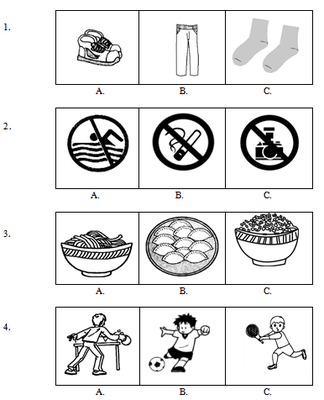
13426319538
4,民大附2013中考权威辅导班热报中
民大附中中考试题与外省市差异很大,普遍感觉偏难。李博士10年来致力于民大附考前辅导,积累了丰富经验。每年都送进民大附了一批优秀学子。
今年我们继续开设民大附考前突击,质量更上一层楼。
民大附中2013中考全国少数民族招生考前班辅导:(外省市初三学生实现北京高考愿望)
所有名师,多年民大附中考辅导经验。每天8小时授课+3小时辅导答疑,全方位管理模式。(可提供吃住。)
2013年5月21日——6月15日全国集中报名。热线:13426319538。
考前长期班全满,E班(15天,6月21日开课)、F(10天,6月26日开课)短期班热报中。
 爱华网
爱华网